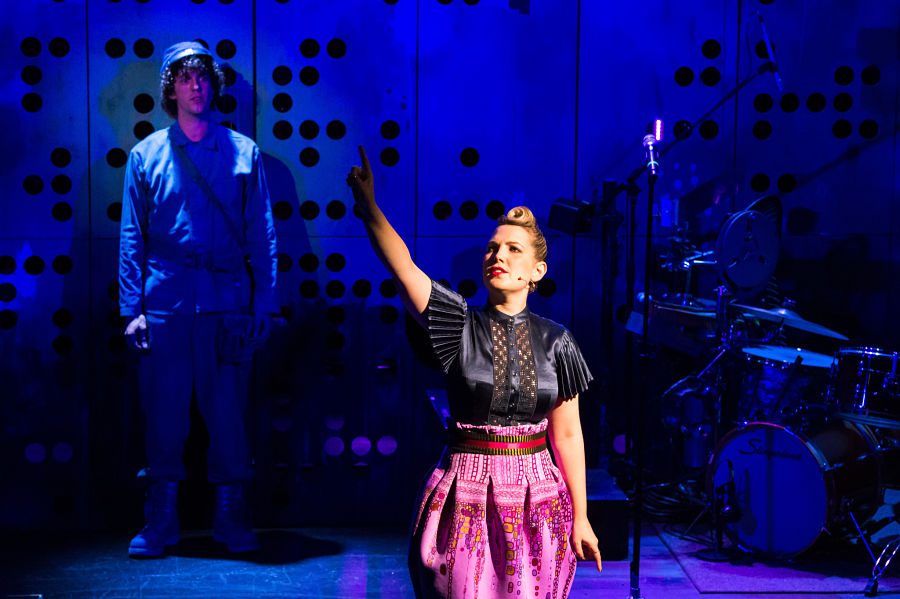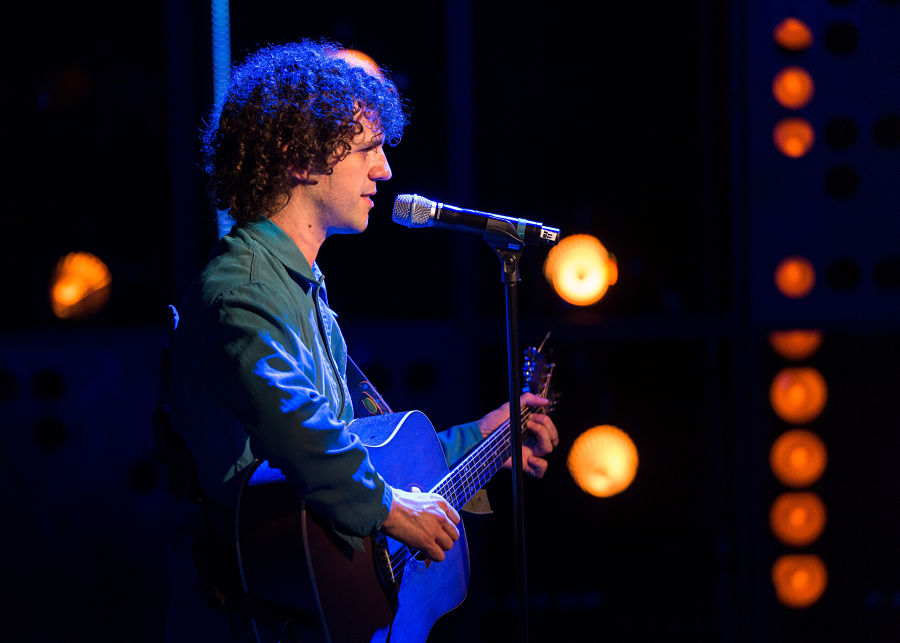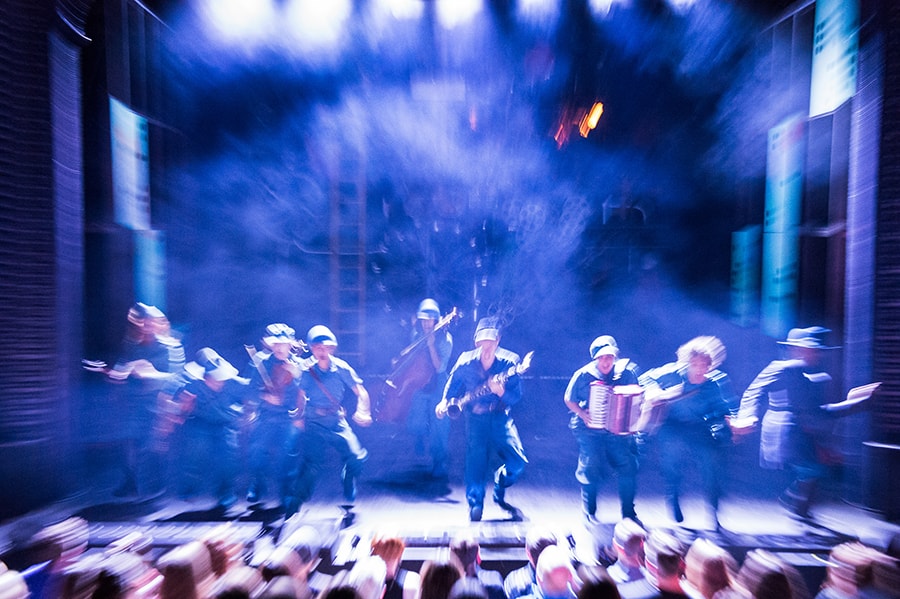NEW YORK CITY: César Alvarez will tell you how he came up with the imaginative idea for his musical Futurity, a coproduction between Ars Nova and Soho Rep now playing at the Connelly Theater through Nov. 15. Alvarez was driving through Virginia on his way home to perform in North Carolina when the image of Civil War soldiers in the woods popped into his head. “I had this silly idea,” Alvarez says with a laugh. “I wondered if any of the soldiers were into science fiction.”
This image of mid-1800s infantrymen with well-thumbed copies of Jules Verne and Mary Shelley in their packs sparked Alvarez to write a concept album for his MFA thesis project at Bard College. A story about a fictional Civil War soldier Julian Munro (played by Alvarez) and Ada Lovelace (played by Sammy Tunis), the real-life mathematician and daughter of Lord Byron, took shape. Through an intellectual romance, the two invent a peaceful machine to end one of the darkest periods in history.

Alvarez quickly realized that the story wanted to be a musical, a form the indie rocker was completely unfamiliar with at the time. “It wasn’t satisfying with the big emotional songs,” says Alvarez of wanting to put more story into his act. “I wanted to actually know what happened to the soldier.”
So he decided to explore the story of Julian with the help of his band, the Lisps. The group, whose vaudevillian and old-timey sounds are often paired with contemporary language and ideas about science, took on the challenge of tackling the mysterious form of the American musical. The band performed the initial version of Futurity in concert form in 2008 at the now-defunct Zipper Theatre with the help of friends, roommates, cousins, and a rented Civil War uniform.
The musical transcends time and space, borrowing a bit from history and dipping into a utopian future, but the imaginative underbelly of the story hits close to home for Alvarez. “The story of Julian is very deeply interconnected to my own childhood,” he says.
And this is the real story of the show’s inspiration: On Nov. 3, 1979, an organization that Alvarez’s parents were involved in planned an anti-KKK rally following a disturbing resurgence of the Klan in Greensboro, N.C. The peaceful demonstration was disrupted when members of the American Nazi Party and the KKK started to yell and shoot the demonstrators. “Five people were killed, and they were all extremely close friends of my parents,” recalls Alvarez. “Two of the people gunned down were César Cauce, who I am named for, and James Waller, who I am also named for. My full name is César James Alvarez.”
He was born a year after the massacre and was seen as a harbinger of light and peace for his parents. Alvarez grew up in the South and used his imagination to grapple with the injustice and violence he witnessed. “What my parents have always taught me is, ‘You can do whatever you want, but this world is very troubled and you really need to work toward making it better.’”

Alvarez’s work has always dealt with the question of how to make the world a better place, and he’s now taken that question to a variety of venues. “I realized all my life I had been trying to tell giant stories with music and had done it some in the dance world, the performance art world, the fine art world, and at rock clubs with my band,” says Alvarez. “I finally got to the theatre world after trying everything else, and they really embraced what I was doing. I found my home.”
After another concert of Futurity was performed at Joe’s Pub in 2009, Alvarez received an e-mail from Sarah Benson, the artistic director of Soho Rep. “I didn’t even know what Off-Broadway was!” Alvarez says. “After our second meeting, she said, ‘I want to direct this.’ And I said, ‘Oh, cool, what do you mean? Direct what?’’’
The combination of music and storytelling, coupled with the potential for inventive design, is what drew Benson in. “It was expanding what a musical can be,” she explains. “I felt like the music was inherently something that I wanted to put in a room with a bunch of people in a theatre environment.”
Benson became the driving force behind Futurity and brought it to American Repertory Theater and the Walker Art Center in 2011, and now at last to the Connelly Theater in the East Village. (In the meantime, Alvarez wrote original music for Benson’s production of An Octoroon at Soho Rep in 2014, and the Lisps created music for the Foundry’s The Good Person of Szechwan in 2013). She has maintained Futurity‘s aesthetic of a concert form by integrating the musicians into the ensemble: Actors and the Lisps form a large band and tell the soldiers’ story armed with banjos, washboards, flutes, and violins.

The Connelly Theater, built in 1864, turns out to be a great home for the show. The intimate space, with its tin-pressed ceilings, is reminiscent of an old opera house, and that trace of a music venue fits the story of Futurity. A pre-show features some of the musicians in the ensemble (and offers free popcorn). And despite the central story of two characters stuck in dismal positions, the show is also plenty of fun, including songs, with such quirky numbers as “Sylvester Magee” and “Every Egg Broke.”
After eight years of working on Futurity, Alvarez isn’t just happy with the show; he’s also become a musical theatre enthusiast of a sort. He’s the artistic director of Polyphone, a festival of emerging musicals at the University of the Arts in Philadelphia, where he also teaches. He tells his students to study the musical theatre form—and disobey it.
“The formula is really valuable, but it is something we need to interrupt,” he says. “I tell them they can tell their stories in their own way and it’s still a musical, it still counts. It’s still actually really interesting.”


